
Jan Tomáš "Miloš" Forman was a Czech-American film director, screenwriter, actor, and professor who rose to fame in his native Czechoslovakia before emigrating to the United States in 1968. Throughout Forman's career he won two Academy Awards, a BAFTA Award, three Golden Globe Awards, a Golden Bear, a César Award, and the Czech Lion.

Jiří Menzel was a Czech film director, theatre director, actor, and screenwriter. His films often combine a humanistic view of the world with sarcasm and provocative cinematography. Some of these films are adapted from works by Czech writers such as Bohumil Hrabal and Vladislav Vančura.
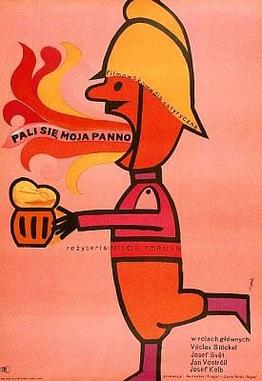
The Czechoslovak New Wave is a term used for the Czechoslovak filmmakers who started making films in the 1960s. The directors commonly included are Miloš Forman, Věra Chytilová, Ivan Passer, Pavel Juráček, Jiří Menzel, Jan Němec, Jaromil Jireš, Evald Schorm, Hynek Bočan, Juraj Herz, Juraj Jakubisko, Štefan Uher, František Vláčil and others. The movement was sometimes called the "Czechoslovak film miracle".
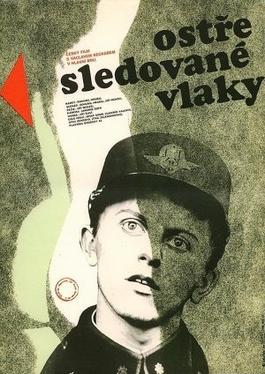
Closely Watched Trains is a 1966 Czechoslovakian New Wave coming-of-age comedy film directed by Jiří Menzel and is one of the best-known films of the Czechoslovak New Wave. It was released in the United Kingdom as Closely Observed Trains. It is a story about a young man working at a train station in German-occupied Czechoslovakia during World War II. The film is based on a 1965 novel by Bohumil Hrabal. It was produced by Barrandov Studios and filmed on location in Central Bohemia. Released outside Czechoslovakia during 1967, it received widespread acclaim and won the Best Foreign Language Oscar at the 40th Academy Awards in 1968. Nowadays the movie is assessed as one of the finest works of the Czech New Cinema.

Atentát is a 1964 black-and-white Czechoslovak war film directed by Jiří Sequens. The film depicts events before and after the World War II assassination of top German leader Reinhard Heydrich in Prague. Czech historians have called the film the historically most accurate depiction of the events surrounding Operation Anthropoid.
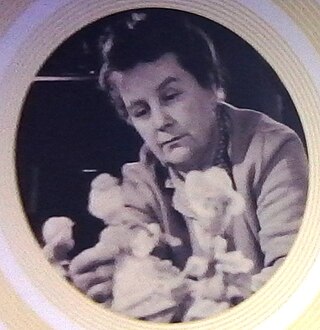
Hermína Týrlová was a prominent Czech animator, screen writer, and film director. She was often called the mother of Czech animation. Over the course of her career, she produced over 60 animated children's short films using puppets and the technique of stop motion animation.

Alexandr Hackenschmied, born Alexander Siegfried George Hackenschmied, known later as Alexander Hammid, was a Czech-American photographer, film director, cinematographer and film editor. He immigrated to the U.S. in 1938 and became involved in American avant-garde cinema. He is best known for three films: Crisis (1939), Meshes of the Afternoon (1943) and To Be Alive! (1964). He made Meshes of the Afternoon with Maya Deren, to whom he was married from 1942 to 1947. His second marriage was to the photographer Hella Heyman, who had also collaborated with Hammid and Deren on several films.
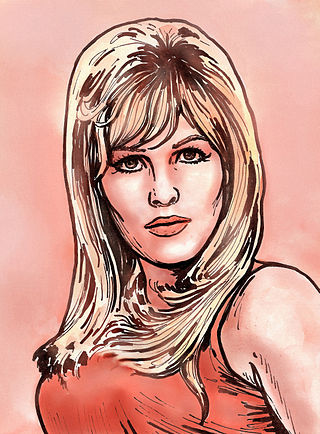
Olga Schoberová, also known as Olinka Bérová, is a Czech-American actress. She acted in Czech, German, Italian, Austrian, Polish, English, and American movies. As "Olinka Berova", she appeared in The Vengeance of She (1968), and several more films. Schoberová has been compared to Brigitte Bardot and Ursula Andress. She is fluent in Czech, English, German and Russian.

Jiří Lábus is a Czech actor. His brother is the Czech architect Ladislav Lábus.
Vladimír Michálek is a Czech film director and screenwriter.

Gustav Machatý was a Czech film director, screenwriter and actor. He directed films in Czechoslovakia, the United States, and Germany, including Erotikon and Ecstasy.

The Film and TV School of the Academy of Performing Arts in Prague or FAMU is a film school in Prague, Czech Republic, founded in 1946 as one of three branches of the Academy of Performing Arts in Prague. It is the fifth oldest film school in the world. The teaching language on most courses at FAMU is Czech, but FAMU also runs certain courses in English. The school has repeatedly been included on lists of the best film schools in the world by The Hollywood Reporter.

Vladimír Čech was a Czech actor, presenter and politician.

Svatopluk Innemann was a Czech film director, cinematographer, screenwriter, film editor and actor. He was one of the pioneers of Czech cinema.
The Mysterious Castle in the Carpathians is a 1981 Czech comedy film directed by Oldřich Lipský. It is based on Jules Verne's novel The Carpathian Castle.

The Academy of Arts, Architecture and Design in Prague is a public university located in Prague, Czech Republic. The university offers the study disciplines of painting, illustration and graphics, fashion design, product design, graphic design, ceramics and porcelain, photography and architecture. Along with other buildings, the academy is part of the city's unique glass art cluster.

Jiří Weiss was a Czech film director, screenwriter, writer, playwright and pedagogue.
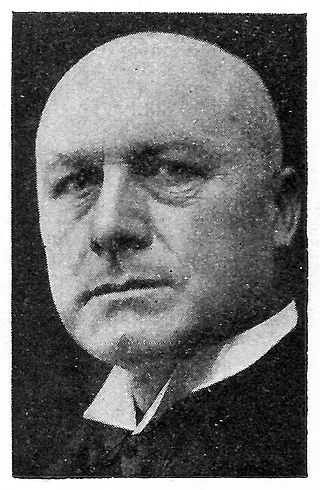
Adolf Dobrovolný was a Czech actor and a radio announcer, the first regular radio news reporter in Czechoslovakia.
Aimless Walk is an unconventional and complex 8-minute film directed by the Czech filmmaker Alexandr Hackenschmied, also known as Alexander Hammid. Released in 1930, the film falls within the experimental documentary genre and is a notable example of European cinema's avant-garde tradition. It has been mentioned alongside city symphony films such as Man with a Movie Camera and Manhatta.
The Girl from Beskydy Mountains is a 1944 Czech drama film directed by František Čáp based on a novel by Miloslav J. Sousedík.
















